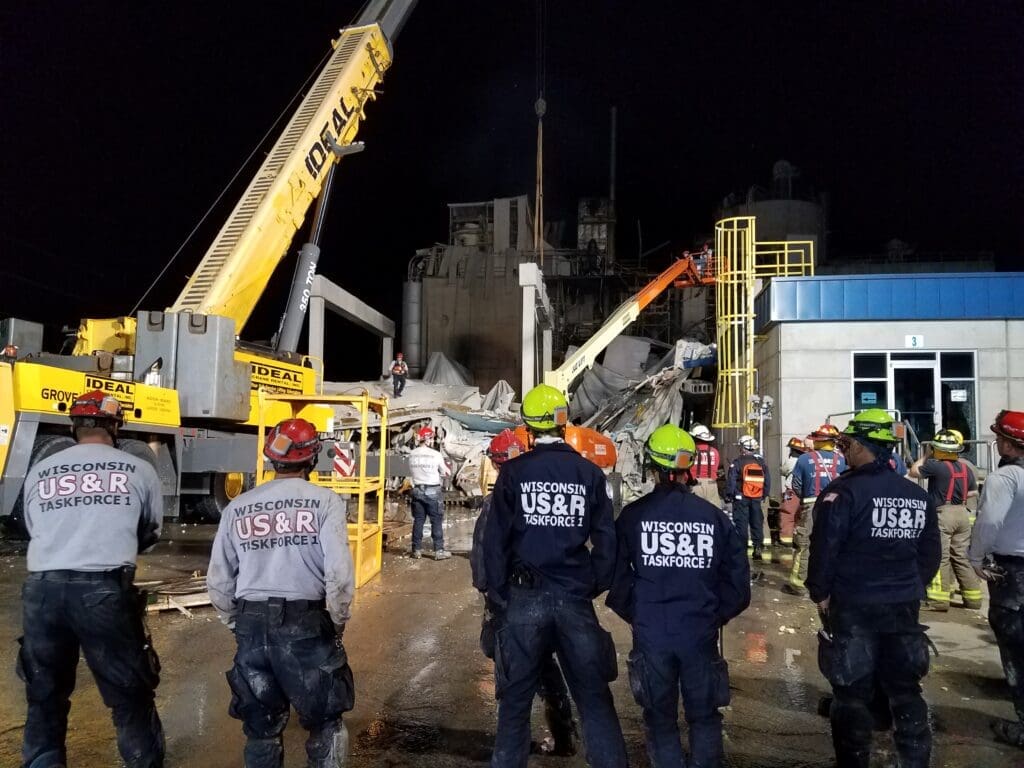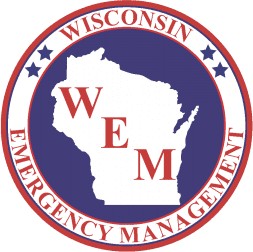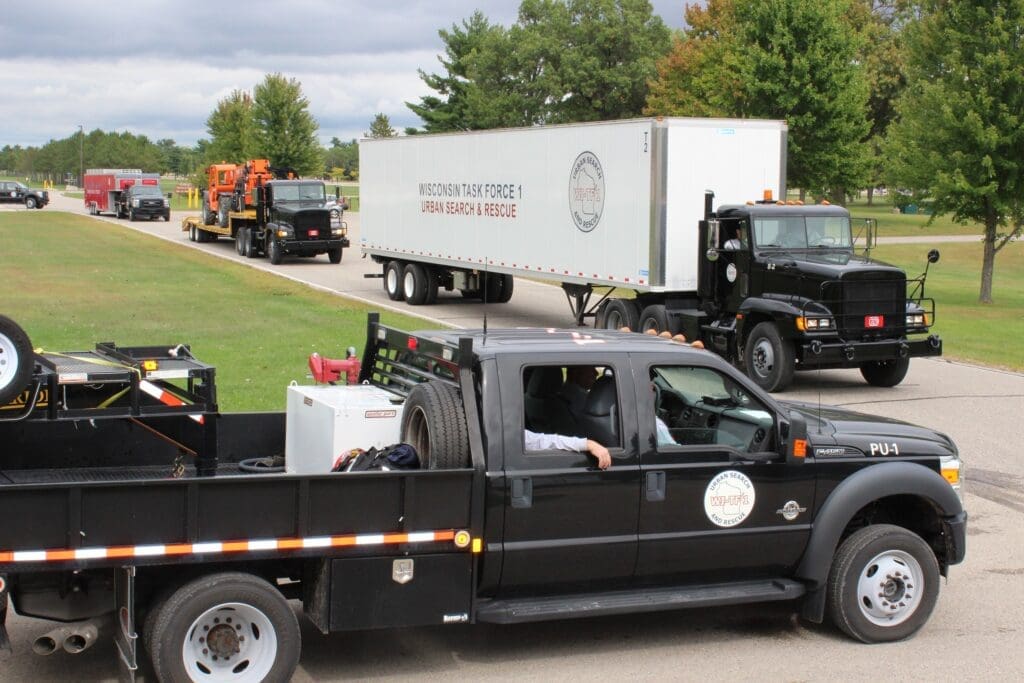
MADISON, Wis. — In the early morning hours of May 2017, an explosion ripped through a corn milling plant in Cambria, destroying the facility and leaving multiple workers trapped inside. Wisconsin’s Urban Search and Rescue Task Force, known as Wisconsin Task Force 1, was called to search the rubble for any signs of life. Now, that newly rebuilt team of firefighters, doctors, canine handlers, and structural engineers is back in action and ready to assist when a major disaster strikes.
“When a local rescue team or response is exhausted, the task force supports them,” said Paul Cooke, Wisconsin Emergency Management Response and Recovery Bureau Director. “The team can assist with large-scale disasters, such as structural collapses, trench rescues, or swift-water rescues. They bring capabilities that communities or regional teams don’t have.”
“Some cities, like Milwaukee or Appleton, are fortunate enough to have enough firefighters to have technical rescue teams,” said Brian OToole, a retired Milwaukee firefighter and member of Wisconsin Task Force 1. “Smaller fire departments will get taxed quickly. If they ask for our help, the task force will be there, not to take over, but assist with what they need.”
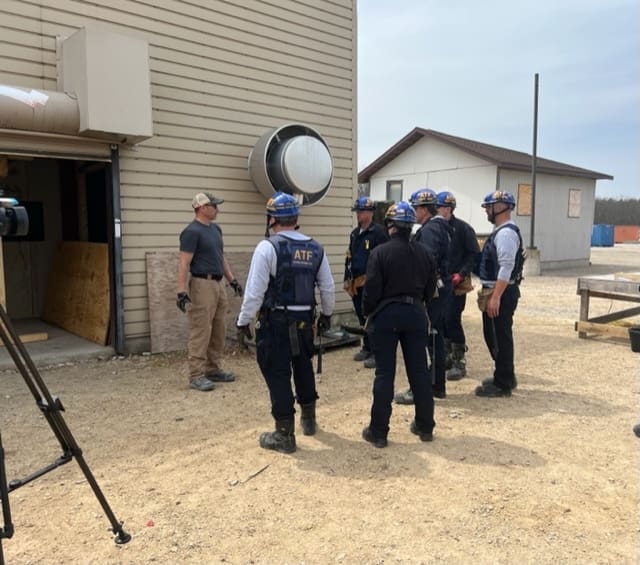
OToole, along with Appleton Battalion Chief Doug Vrechek, have been a part of Wisconsin Task Force 1 since its early stages, when it was first created after Wisconsin received federal Homeland Security grant funds following the September 11, 2001 terrorist attacks. Initially, there was a network of 13 different structural collapse teams, which was later consolidated to four regional teams. Ultimately, it became one statewide team containing all skillsets that could be deployed anywhere in Wisconsin or to responses in other states.
“Who is on Task Force One depends on what the emergency is, we all have our own specialties,” said Vrechek, one of the task force’s leaders. “From people with technical search equipment skills to search and rescue canines to paramedics and an emergency room doctor, these people are striving for that next big thing and want to excel in their career and continue to learn.”
Team members have day-to-day jobs in communities around the state. When they join the task force, they take part in more than 300 hours of general rescue and position-specific training. They also participate in exercises to help prepare them for real-life scenarios.
“Anytime you tackle another skill in the fire service, you’ll be better in your job back at home,” said OToole. “I know after I was involved in the task force, I learned a lot of things that I took back home and taught my department.”
“There’s an endless amount of learning on the task force and the state provides excellent training,” said Vrechek. “Wisconsin Emergency Management brings in people from all over the country who are experts in the search and rescue field. In turn, that knowledge allowed us to develop our own group of instructors who are now going all over the country to teach technical rescue classes to the army or other groups.”
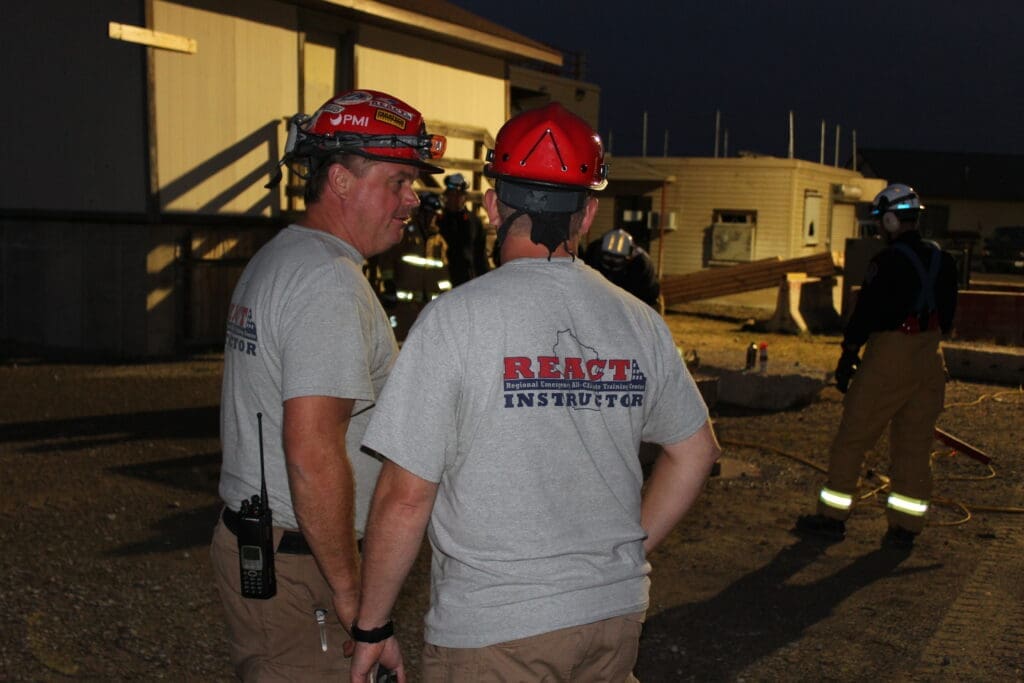
When Wisconsin Task Force 1 is needed, team members report to Regional Emergency All-Climate Training (REACT) Center at Volk Field in Camp Douglas to get their protective gear, equipment, and vehicles to respond to a disaster. Since its creation, the task force has been mobilized four times.
Its first mobilization occurred in June 2017 at the request of the Cambria Volunteer Fire department to assist in the search for victims following the explosion and structural collapse of a milling plant. It was deployed later that year to assist with search and rescue efforts in Florida following Hurricane Irma. That mission was canceled days later after damage was less severe than anticipated.
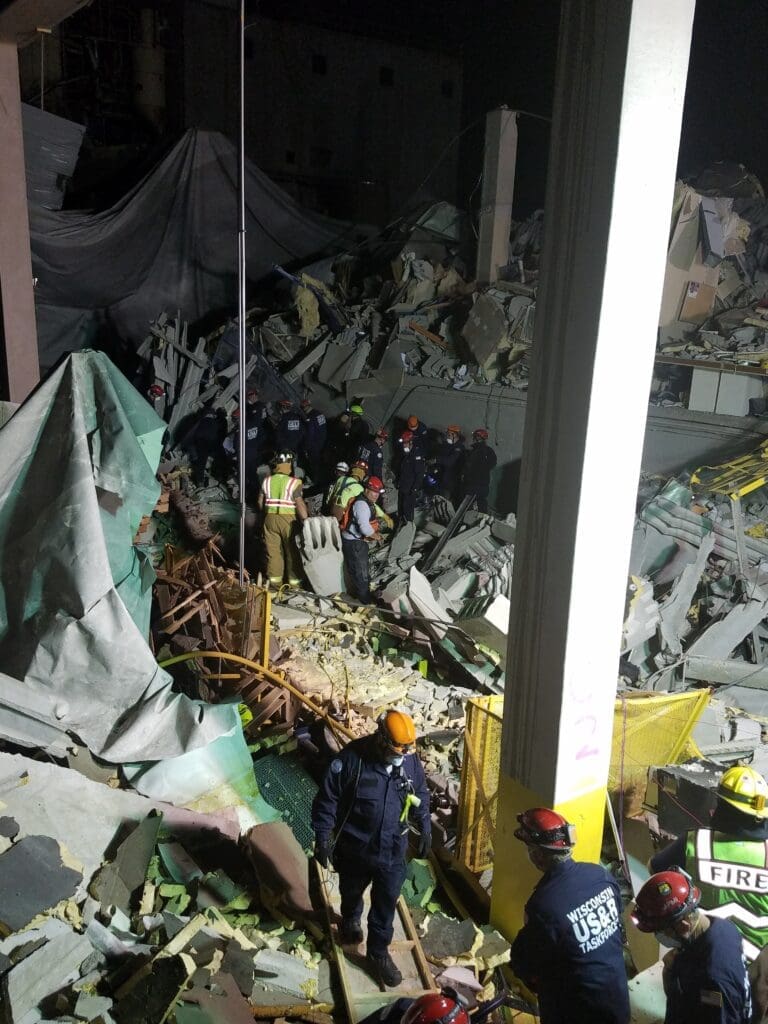
Part of the team was also called on during flooding in August of 2018, when 22 members of Wisconsin Task Force 1 helped rescue more than two dozen people and five dogs from flood waters in Crawford County. Less than a week later, roughly 20 team members staged at Volk Field to be ready for possible deployment after continued storms caused floodwaters to rise. They were not needed to respond to any incidents.
Wisconsin Task Force 1 was suspended after 2018 due to contractual issues. Changes were needed in state statute regarding how the task force was utilized and funded. Those issues were resolved by the Wisconsin Legislature in 2022, and the task force resumed operations on August 1 of this year. More than 90 members of Wisconsin Task Force 1 have returned to the team.
“Right now, we are recruiting to fill current gaps,” said Cooke. “We’re down a doctor, an engineer, and some canine handlers. We won’t be doing a wider recruitment for the task force until that additional funding is received.”
OToole and Vrechek are thrilled to have the team back up and running and look forward to adding some new faces to the team.
“Most of the leaders on this team are getting towards the retirement stage in our careers,” said OToole. “I’m getting a little older, and there needs to be a younger generation.”
“We’re getting a lot of gray hairs,” joked Vrechek. “We want to help the next generation get into these open positions and pass on our experience to help create new leaders.”
Part of the new generation of task force members includes Margaret Zieke. She has prior experience as a volunteer firefighter and learned about Wisconsin Task Force 1 during her previous job at Wisconsin Emergency Management.
“When I started with Wisconsin Emergency Management in 2014, I had an awareness of what the team does and thought it was cool,” said Zieke. “I heard about the amazing things these folks can do and thought it was neat, but I didn’t feel I had the experience and was at that level to join, so I put it out of my head.” Several years passed and Zieke continued to build her skills. She received training as a hazardous materials technician, learned about interoperability for emergency communications, and is currently the public safety broadband manager for the Wisconsin Office of Emergency Communications. Her knowledge attracted attention, and what was wishful thinking became reality.
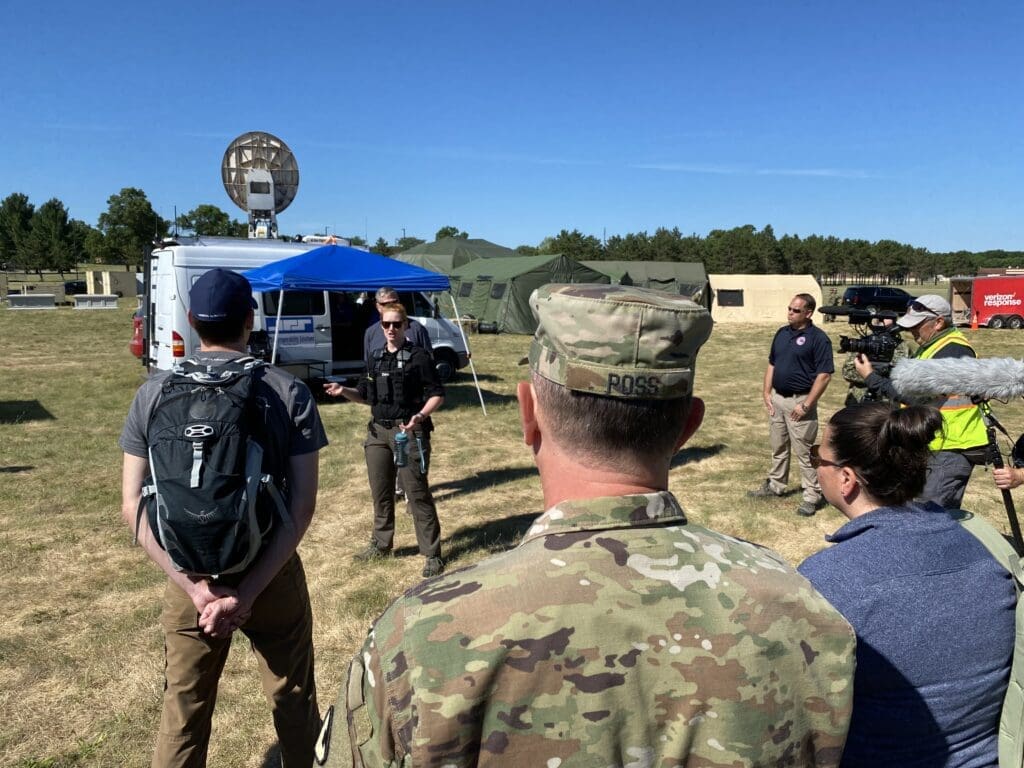
“I didn’t think it would be a possibility until some people suggested me to fill the communications role on the task force,” said Zieke. “I love their mission. My skills help set up communication pathways during an emergency. I am helping to build the foundation of a mission, being able to speak to one another, which could have deadly consequences if you can’t talk, and others hear you.”
Zieke is not only excited to share her knowledge and experiences, she looks forward to receiving information from other members of the team.
“We all have a unique perspective, and by bringing all those perspectives together, it makes a stronger team,” said Zieke. “The task force also makes Wisconsin communities stronger when they bring those skills back home.”
In the future, Wisconsin Task Force 1 will eventually have more than 200 members on the team, according to Cooke. This would allow different groups to conduct around-the-clock search and rescue operations in 12-hour shifts for multiple weeks. It would also closely mirror the Federal Emergency Management Agency model, so when Wisconsin Task Force 1 is called to assist in other states, it can mirror the FEMA Urban Search and Rescue capabilities.
“We have an opportunity right now to become one of the nation’s best urban search and rescue teams,” said Vrechek. “Before we wound down in 2018, a lot of states looked to our team, and wanted to be us. They wanted to be where we were, and where we are going. I think we can get up there and be one of the best task force teams around.”
Vrechek, Cooke, O’Toole, and Zieke are looking forward to the team participating in its first exercise together in October to test their processes from notification to demobilization. The training and exercises Wisconsin Task Force 1 participates in helps Wisconsin become more resilient.
“Any Wisconsinite can be proud there is a team of highly qualified and highly motivated task force available at a moment’s notice,” said Cooke. “You hope that you never need to call it or use it, but it’s available right here and right now should the need arise.”
“It’s something to be proud of,” said OToole. “We want to make a difference. Being on Wisconsin Task Force 1 can be challenging. Sometimes you could be working a 12-hour shift or be doing multiple shifts in a response for weeks. It’s very hard, dirty work, but someone has to do it. There’s a need for this in our state and members of the task force want to step up and do it.”
“On your worst day, you want to know that someone is going to take care of you. The next time there is an explosion, or building collapse, we need to have a capability like Task Force 1, to take care of people in communities and tribes across the state,” said Zieke. “It’s about preparedness. You prepare for the bad days and hope for the good days. Having this team makes our state stronger and makes us a national asset.”
